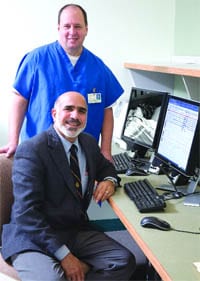Crohn’s and Colitis Incurable, but Treatable
Crohn’s disease and ulcerative colitis are digestive disorders and types of inflammatory bowel disease. The two conditions reach all populations, with men and women affected equally. They can strike at any time in one’s life, though they are more prevalent between the ages of 15 and 35. About 30,000 new cases are diagnosed every year, according to the Crohn’s and Colitis Foundation of America. Here are some basic facts about these diseases, which together affect about 1.4 million Americans.
Crohn’s (named after an American physician who was one of the first to describe the disease in 1932) primarily afflicts the small intestine (about 70{06cf2b9696b159f874511d23dbc893eb1ac83014175ed30550cfff22781411e5} of cases occur there), but it can also affect other parts of the digestive tract, such as the stomach or esophagus. Colitis gets its name from the part of the body that it attacks — the colon, or large intestine. Both conditions strike the intestines, and they can also hit other parts of the body as well, including the skin, eyes, mouth, liver, and joints. Effects can range from mild to severe and can be intermittent, coming and going through the years.
The exact causes of these conditions are unknown, but they appear to result from an improper reaction by the body’s immune system. The immune system is designed to protect us from harmful bacteria, viruses, and disease, but with Crohn’s and colitis, it overreacts to bacteria in the digestive tract and causes chronic, persistent inflammation.
Crohn’s and colitis can be frustrating for patients. In addition to unknown causes, they have no known risk factors (though they tend to run in families), and no preventive measures can be taken to avoid them. I often tell patients that they’ve done nothing to bring this on, and there’s nothing they could have done to prevent it; rather, it’s just something that happens. A common misconception about Crohn’s and colitis is that stress causes the conditions, but it doesn’t cause or worsen either disease; it just makes the person feel worse.
Crohn’s and colitis have similar symptoms, including abdominal cramping, bloating, and diarrhea. Colitis can include rectal bleeding, and Crohn’s can lead to weight loss, as the disease affects the small intestine and disrupts the nutritional activity that normally occurs in that part of the body. Because the symptoms of Crohn’s and colitis, such as diarrhea and abdominal cramping, are not specific to those conditions, most cases are diagnosed months to years after patients first experience the signs of the diseases.
Patients with Crohn’s or colitis are usually treated by a gastroenterologist, a medical doctor specializing in disorders of the digestive system and gastrointestinal tract. Several methods are used to diagnosis these conditions, including the patient’s description of the symptoms; a CT scan, which uses X-rays to make detailed pictures of what’s inside the body; an endoscopy, a procedure that takes an actual look into the intestinal tract with a small camera to see if inflammation exists; or an upper GI series, a series of tests examining the gastrointestinal tract.
Patients diagnosed with these conditions must understand that these are lifelong diseases, and that no cure currently exists for either. The good news is that many excellent treatments are available (and many more are in research and development). Among the possible therapies are dietary changes, medications such as anti-inflammatory steroids and biologics, or, in more severe cases, surgery. In fact, about 75{06cf2b9696b159f874511d23dbc893eb1ac83014175ed30550cfff22781411e5} of Crohn’s patients and 25{06cf2b9696b159f874511d23dbc893eb1ac83014175ed30550cfff22781411e5} of colitis patients eventually have surgery.
Because of the way in which the diseases affect the body’s digestive system, a major concern of patients with Crohn’s and colitis is the effect they have on daily living, including social and professional activities. But here’s more good news: most patients with Crohn’s or colitis can have a normal life. Just like someone who has arthritis or asthma, patients can learn about the things that precipitate and aggravate the conditions, what to avoid, and how to treat it. Crohn’s and colitis need not dictate or overwhelm daily living. For most patients, as long as they’re under the care of a physician, a normal, healthy life is possible.
If you are experiencing the symptoms described here, check with a primary-care physician; you may need to be seen by a gastroenterologist. For more information, visit the Crohn’s and Colitis Foundation at www.ccfa.org. For a video discussion, visit www.physicianfocus.org/
Dr. Andrew Warner is chief of Gastroenterology at Lahey Health in Burlington and the co-author of “100 Questions & Answers About Crohn’s Disease and Ulcerative Colitis.” This article is a public service of the Mass. Medical Society.



Comments are closed.